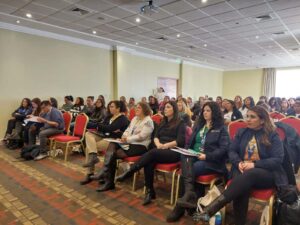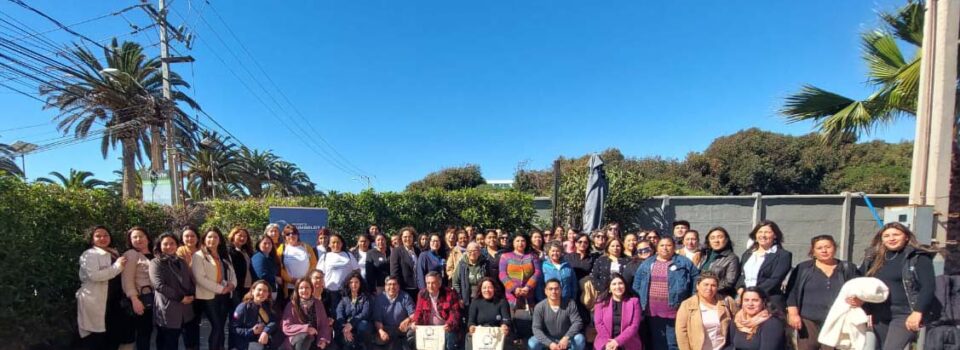Women in artisanal fishing meet to exchange experiences
August 16th, 2024 La Serena, Coquimbo, August 8, 2024 – With the aim of promoting the empowerment, visibility and appreciation of the roles played by women throughout the artisanal fishing chain, the GEF/UNDP SUBPESCA/Vice Ministry of Fisheries and Aquaculture Humboldt II Project, an initiative carried out by the Undersecretariat of Fisheries and Aquaculture of Chile and the Ministry of Production of Peru and implemented by the United Nations Development Program (UNDP), organized the Meeting of Women in Artisanal Fishing and Related Activities of Coquimbo-Chile. The National Fisheries and Aquaculture Service (SERNAPESCA), the National Institute for the Sustainable Development of Artisanal Fishing and Small-Scale Aquaculture (INDESPA), and the Fisheries Development Institute (IFOP) participate in this important binational initiative.
La Serena, Coquimbo, August 8, 2024 – With the aim of promoting the empowerment, visibility and appreciation of the roles played by women throughout the artisanal fishing chain, the GEF/UNDP SUBPESCA/Vice Ministry of Fisheries and Aquaculture Humboldt II Project, an initiative carried out by the Undersecretariat of Fisheries and Aquaculture of Chile and the Ministry of Production of Peru and implemented by the United Nations Development Program (UNDP), organized the Meeting of Women in Artisanal Fishing and Related Activities of Coquimbo-Chile. The National Fisheries and Aquaculture Service (SERNAPESCA), the National Institute for the Sustainable Development of Artisanal Fishing and Small-Scale Aquaculture (INDESPA), and the Fisheries Development Institute (IFOP) participate in this important binational initiative.
The event was attended by more than 60 women, seaweed collectors, divers, shellfish gatherers, filleting women, marketers, among other activities, from the coves of San Pedro, Puerto Aldea, Tongoy, Los Vilos, La Sierra and Chungungo.
During the activity, leaders and representatives of the associations gave presentations on their experiences, challenges and achievements in fishing activity, where they also highlighted the importance of recognizing and supporting the crucial role that women play in artisanal fishing and their contribution to the sustainable development of coastal communities.
In addition to local experiences, the meeting had the valuable participation of representatives and specialists from the fishing institutions, who shared the progress that, from their respective institutions, is being made to incorporate the gender approach and the empowerment of women in artisanal fishing.
During his presentation, Javier Chávez, SUBPESCA zonal director for Atacama and Coquimbo, highlighted the legislative and strategic advances in the Chilean fishing sector, underlining the importance of equity in its multiple dimensions: gender, territorial and intergenerational. In particular, he emphasized the integration of women in governance spaces and the importance of the Regional Women’s Roundtables as a fundamental tool to address gender gaps in the sector, allowing for more equitable and effective participation in decision-making.
Cecilia Solís, regional director of Sernapesca, stressed that it is essential to make women’s contribution visible and encourage their participation in leadership roles within the sector. In many coves, although women actively participate, the leaders are still mostly men. We need more female leaders who represent the diverse and valuable perspectives that women bring to this activity,” she said.
Gisela Irribarra, head of the Department of Artisanal Fishing, and Lisette Montesy, head of the Information Management and User Service Department of SERNAPESCA, presented the requirements to join the Registry of Related Activities (RAC). They highlighted that this registry, essential to make visible and recognize the work of people, mainly women, dedicated to activities complementary to fishing, already has more than 3,800 registrations nationwide. This progress reflects the commitment of the sector to improve working conditions and promote gender equality in artisanal fishing, complying with the provisions of Law No. 21,370.
In her speech, Nilse Rabet, representative of INDESPA, highlighted the need to identify the differences in the needs of men and women within the sector, in order to offer adapted responses that promote equity. In addition, she emphasized the importance of promoting the active participation of women and facilitating their access to programs and instruments for productive development and technical assistance. Key initiatives mentioned include the “Capital Semilla Emprendedora Artesanal” and “Capital Semilla Inicia” programs, which offer essential support for projects led by women in this sector.
From the perspective of women’s contributions to fisheries research, Nancy Barahona, senior researcher at IFOP and member of the Benthic Scientific and Technical Committee, highlighted the female participation in the various instances of the current institutionality, such as scientific committees or management committees, highlighting that the new research vessel managed by IFOP bears the name of the distinguished researcher Mrs. María Angela Barbieri. It was also highlighted that one of the pilots and scientific operators on board this scientific vessel are women. However, although progress has been made, it is mentioned that it is necessary to expand the spaces for women’s involvement in this area. The institute also collaborated with interesting dissemination material.
During the meeting, the attendees discussed the barriers they face to fully integrate into this sector, identifying challenges such as lack of access to resources, the invisibility of their work and the scarce representation in decision-making spaces. Based on these reflections, strategies were explored to strengthen the organization of women, as well as their training needs in relation to the activities they carry out.
This meeting is part of a series of events organized by the “Humboldt II” Project, to strengthen the knowledge and skills of women in artisanal fishing. Through these spaces, the aim is not only to enhance their empowerment and autonomy, but also to promote the creation of support networks and the exchange of experiences at the local and regional level between the two countries, key elements to face the challenges of the sector and move towards greater gender equality.
